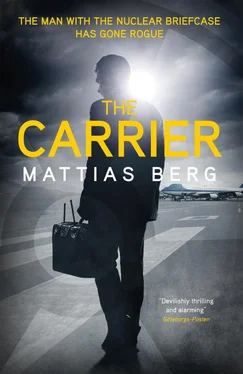Mattias Berg - The Carrier
Здесь есть возможность читать онлайн «Mattias Berg - The Carrier» весь текст электронной книги совершенно бесплатно (целиком полную версию без сокращений). В некоторых случаях можно слушать аудио, скачать через торрент в формате fb2 и присутствует краткое содержание. Город: London, Год выпуска: 2019, ISBN: 2019, Издательство: MacLehose Press, Жанр: Триллер, на английском языке. Описание произведения, (предисловие) а так же отзывы посетителей доступны на портале библиотеки ЛибКат.
- Название:The Carrier
- Автор:
- Издательство:MacLehose Press
- Жанр:
- Год:2019
- Город:London
- ISBN:978-0-85705-788-4
- Рейтинг книги:4 / 5. Голосов: 1
-
Избранное:Добавить в избранное
- Отзывы:
-
Ваша оценка:
- 80
- 1
- 2
- 3
- 4
- 5
The Carrier: краткое содержание, описание и аннотация
Предлагаем к чтению аннотацию, описание, краткое содержание или предисловие (зависит от того, что написал сам автор книги «The Carrier»). Если вы не нашли необходимую информацию о книге — напишите в комментариях, мы постараемся отыскать её.
The Carrier — читать онлайн бесплатно полную книгу (весь текст) целиком
Ниже представлен текст книги, разбитый по страницам. Система сохранения места последней прочитанной страницы, позволяет с удобством читать онлайн бесплатно книгу «The Carrier», без необходимости каждый раз заново искать на чём Вы остановились. Поставьте закладку, и сможете в любой момент перейти на страницу, на которой закончили чтение.
Интервал:
Закладка:
And then it was February 2013.
I was going to celebrate my birthday, in peace and quiet as usual, with a simple dinner at home with my family. On the morning of that day yet another brown envelope was in my mailbox. But this time the outer appearance was different because the envelope creased around the contours of a hard, flat object within and it had been carefully taped.
At the top I read “HAPPY 50TH BIRTHDAY!” in the same neat hand as ever. Under it was the usual address. I sat there for a long time before I pushed the D.V.D. into my computer, fingering it, inspecting the plastic, trying to weigh the risk, judging whether our little game was going to end like this—with a banal explosion in an office in D.C.’s Catholic University. But I ran it through my own private anti-virus program, obviously not the university’s inadequate one, and started to play the movie.
I had seen “Mata Hari” once before, at the university’s film club during my student years. But it had not left much of a mark. Seeing it now, I was surprised by how powerful the movie was. From the first scene—the firing squads executing the spies, its sudden brutality—all the way to the dark ending. When Greta Garbo as Mata Hari is led away to her end, head held high, her back to the camera: the spy who was said to have bewitched the whole of France.
After the end of the movie I felt extremely unwell. I went out, drank a few mouthfuls of water from the fountain, took some deep breaths in the dead end of the corridor where I had my room. Nothing helped.
So I lowered my head between my knees and small symbols seemed to start spinning inside my closed eyelids. I opened my eyes, shut them again and sat down at my desk with a pen in my hand. Tried to wait out my twitching muscles, the interplay between my brain and my reflexes, but without success.
I pushed the disc in again, did my best to relax, make myself as receptive as possible. A little more than half-way through I again felt my sub-conscious being stirred in that peculiar way. Now I was convinced.
In the Team we had tried out steganography. The old art of concealing the fact that a secret message exists at all, as distinct from cryptography which only hides the message itself. The classic example was Histaios, the tyrant of Miletus in the late sixth century B.C., who had his slave’s head shaved and inscribed on the bald scalp an important dispatch about an impending war. He waited for the slave to grow his hair back before sending him off.
Even that technique had its shortcomings. To begin with, the one thing that is rarely described in the story: how to convey to the recipient what needs to be done to get at the message, for example shave the messenger’s head. If you make that too clear—in the old days by writing, more recently with a telephone call or yet another dispatch using a different technique—the information becomes too vulnerable and easy to crack. And if not clear enough, how would one know that there was even something being transmitted?
I ran the movie from the start a second time, and waited for that strange feeling to grow again. This message would presumably be double-encrypted. Partly with steganography—some kind of message hidden within the file, being the movie—and partly with some subliminal technique. The hidden message can only have been shown for a tenth of a second or so, at the most a few frames, something which our normal perception would not pick up.
That is why I had felt so ill. When my conscious was trying to catch at something which by its nature was out of reach.
After watching the movie again, its symbols remaining insufficiently clear, I downloaded the steganography programs which we had tested in the Team. SteganPEG, Secret Layer and QuickStego, which could both hide intelligence and crack the codes.
Digital steganography, the art of hiding secret messages within apparently innocent data files such as family photographs or YouTube clips, had become fashionable some years earlier. But in the endless race between the code setters and the code breakers, even this technique started to be hauled in. One of its drawbacks was the change in file size, noticeable however small the message.
But none of the programs helped me to uncover the information I was looking for. I sat through the entire afternoon, watching the movie over and over, without getting any further than identifying the frame in which the message must have been planted. In the scene in which Mata Hari starts to tug at General Shubin’s arm—to stop him from revealing her adored Rosanoff as a spy—that feeling in my brain started assert itself. And then it reached its climax at the precise moment when Mata Hari shoots Shubin.
Darkness had fallen outside the tall windows of my office when my right hand started to move the pen over the notebook, as if of its own accord. There were thirteen numbers and two letters there now: 161 221 192 D12 U15.
As if straight from my sub-conscious, written out automatically.
Then there was only one thing left to do, whether I wanted it to or not. The words rolled out from the back of my head. I love you just as senselessly as my pretty weird and hellish father, for the time being and onward into eternity, Amen . There was no doubt. Reading the sequence of numbers as 16, 12, 21, 19, 2, D, 12, U and 15 and using my key sentence resulted in something that simply could not be a coincidence.
The clear text was “THE OLD HUT”. And the unfathomable implication was not only that somebody other than my mother and I knew the key sentence—but also that the same person was aware of the boys’ and my favorite hiding place in the abandoned playground.
Now that I knew what I knew, I literally had no idea where to turn. I went out into the deserted corridor, but the automatic neon lights had little time to come on before I went back into my room again. Threw up into the sink. Sat on the floor with my head again between my knees, while the nausea rose and fell.
Eventually I got to my feet and walked all the way to the abandoned playground. My watch showed 19.04. If I was quick I could still get home in time for the birthday dinner.
There was nobody to be seen. I pushed my way into the dark bushes where the hut had once been. Pulled on my gloves, felt under the last of the rotting bits of plank—and immediately found the cell phone.
There was a grayish envelope symbol in the primitive display. The message was encrypted using the same key sentence. I ran my eyes over the thirty-five characters, as a musician would read a score: 615 19C K12 192 814 20V 216 219 162 181 721 R/1.
In clear, “STOCKHOLM FIVE SEPTEMBER”.
Suddenly I had a direction, a place, a goal—as well as a dispatcher. The last number was a signature as clear as anything could be in the world of cryptology. Because it was the position for the letter “alpha” in the Greek alphabet.
I no longer had the slightest shadow of a doubt. The message could only have been signed by one person—or machine.
1.09
Unblessed are the believers, Edelweiss used to say. Blessed are those who know.
So I did not speculate how Alpha could have known my greatest secret, the key sentence, the scene with Mom at the kitchen table thirty-seven years ago. Could have cracked the code to my whole life. Not then—when all I did was to delete the simple message and reply 19K, “O.K.”, before I put the cell phone back in the same place. Nor after that time, either.
Partly because I could never be sure if I was communicating with man or machine. And partly because it was all overshadowed by the realization that I had somehow managed to acquire an ally, a confidant.
I had been wondering about escape for so long, been looking for the opportunity, indeed ever since my basic training at West Point. And when I became part of the Team, that temptation had only grown. After I got involved in the nuclear weapons administration and was given my assignment, became one of the carriers. Saw how far-reaching the issue was.
Читать дальшеИнтервал:
Закладка:
Похожие книги на «The Carrier»
Представляем Вашему вниманию похожие книги на «The Carrier» списком для выбора. Мы отобрали схожую по названию и смыслу литературу в надежде предоставить читателям больше вариантов отыскать новые, интересные, ещё непрочитанные произведения.
Обсуждение, отзывы о книге «The Carrier» и просто собственные мнения читателей. Оставьте ваши комментарии, напишите, что Вы думаете о произведении, его смысле или главных героях. Укажите что конкретно понравилось, а что нет, и почему Вы так считаете.












